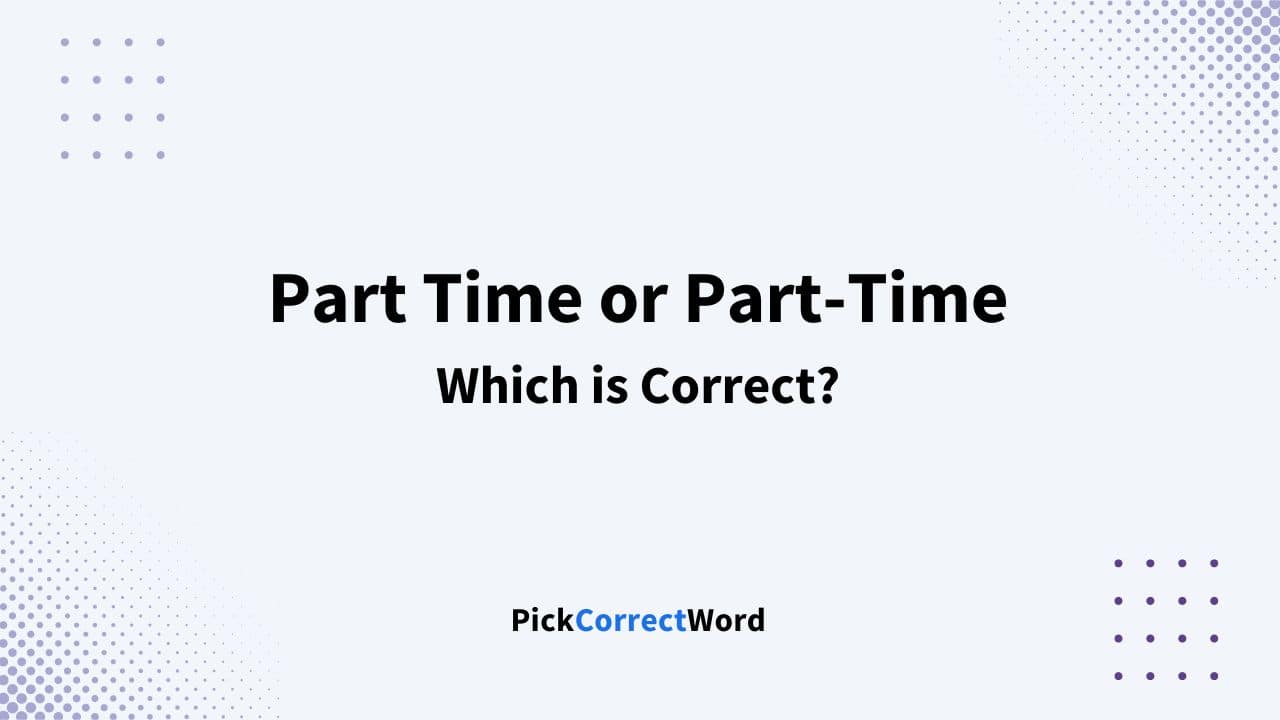Ever get confused about whether you should write part time or part-time when talking about your work schedule or looking at job ads?
When you use ‘part-time’ with a hyphen, it’s usually an adjective that describes jobs that aren’t full-time. On the other hand, ‘part time’ without the hyphen is used when ‘part’ is acting as a noun and ‘time’ is describing it.
So, is one of them incorrect? Not really—it just depends on how you use it in your sentence. Let’s explore this below.
Part Time or Part-Time? Which is Correct?
Both “part time” and “part-time” are correct, but you use them differently.
Part-time is an adjective you use when talking about a job or work schedule where you work fewer hours than a full-time employee.
- “She has a part-time job at the library.”
Part time without a hyphen is often used when ‘part’ is the noun and ‘time’ is describing it. This phrase describes how someone works.
- “He works part time as a consultant.”
| Without Hyphen (after noun) | With Hyphen (before noun) |
| She works part time. | She has a part-time job. |
Part time: Meaning and Usage
In English, you usually use ‘part time’ as an adverb to talk about how much time you spend on an activity. It’s important to know when and how to use this phrase correctly.
‘Part time’ is a way of describing how often or for how long you do something. When you work ‘part time’, you’re doing a job or activity for less than the usual full-time hours.
As an adverb, ‘part time’ describes verbs and answers the question ‘how?’ about the action that the verb is talking about.
Example:
You work only part time at the bookstore.
Part-Time: Meaning and Usage
The term ‘part-time’ with a hyphen isn’t about how long the job lasts, but rather the kind of employment it is. It’s used to describe jobs that don’t take up the full standard working hours.
You’ll often come across ‘part-time’ when talking about these kinds of jobs. The hyphen here has a grammatical purpose.
When you use ‘part-time’ before a noun, the hyphen joins the two words into a combined adjective.
For instance, in “a part-time employee,” the hyphenated ‘part-time’ is describing the noun ’employee.’
Examples of Using “Part Time“ in A Sentence
“You often work part time to balance your studies and job.“
“Many students prefer part time jobs for extra income.“
“Working part time allows you to explore other interests.“
“If you’re considering part time employment, assess your schedule first.“
“Volunteering part time can be deeply rewarding.“
Examples of Using “Part-Time“ in A Sentence
“Finding a part-time job can be a great way to gain experience.“
“Many students prefer part-time schedules to balance work and classes.“
“She transitioned to part-time work after her baby was born.
“Balancing a part-time job with other commitments requires good time management.“
“Employers often offer part-time positions with flexible hours.“
Frequently Asked Questions
What is the grammatical rule for using ‘part-time’ in English?
The term “part-time” is hyphenated when used as an adjective, as in “part-time job.” This is because it combines two words that together modify a noun.
Is “parttime” correct Usage?
No, “parttime” is not the correct usage when referring to employment status. The correct term is “part-time,” with a hyphen.
What is the difference between ‘full-time’ and ‘part-time’ in terms of hyphenation?
Both “full-time” and “part-time” are hyphenated when they function as adjectives. The hyphenation indicates that the two words together describe a type of employment status.


